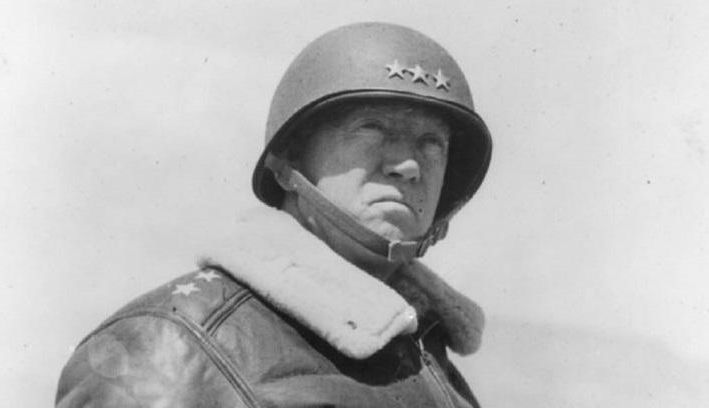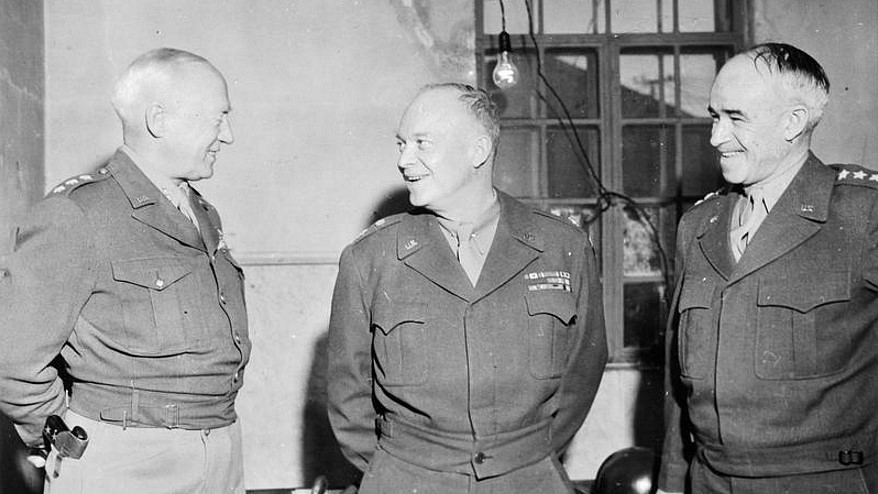Authors:
Historic Era: Era 8: The Great Depression and World War II (1929-1945)
Historic Theme:
Subject:
Summer 2012 | Volume 62, Issue 2


Authors:
Historic Era: Era 8: The Great Depression and World War II (1929-1945)
Historic Theme:
Subject:
Summer 2012 | Volume 62, Issue 2

On the morning of December 19, 1944, General Dwight D. Eisenhower strode into the gloomy school building in Verdun that housed the main headquarters of General Omar Bradley’s Twelfth Army Group. He had called a meeting of all the senior commanders under Bradley. More than just the building was gloomy; the weather outside was a dark gray, and the tactical situation facing the American Army in Europe was also dark. Adolf Hitler’s gigantic Ardennes counteroffensive had been launched three days before, and German Gen. Hasso von Manteuffels’s Fifth Panzer Army was about to surround the all-important road junction at Bastogne. The news had reached the United States, and near panic reigned from across the ocean.
This was the first meeting of the commanders since the counteroffensive began, and they had received no news to be optimistic. Perhaps to their surprise, they found the Supreme Commander in an upbeat mood. “The present situation is to be regarded as one of opportunity for us and not disaster,” he admonished. “There will be only cheerful faces at this conference table.”
Ike’s optimism, which was based on the latest intelligence estimates, gave everyone a lift. His remark was overshadowed, however, by the falsetto voice of an ebullient George S. Patton, commander of Third Army. “This bastard,” he shouted, referring to von Manteuffels, “has put his cock in a meat grinder and I’ve got ahold of the handle!” Everyone chuckled. George fought wars with professional competence and with zest.
Eisenhower and Patton began planning to launch a counterattack northward toward Bastogne. Eisenhower asked how soon Patton could be ready. “Three divisions in two days,” came the reply. Eisenhower was doubtful of Patton’s ability to move so quickly but didn’t press the point. Patton excused himself and went to the telephone. Reaching his Third Army headquarters, he gave a simple code word, representing one of the three anticipated options he had left with his staff that morning. Thus was launched Third Army’s attack to relieve Bastogne, a feat that was completed exactly a week from the meeting at Verdun. This was Patton the tactical genius at his best.
Unfortunately, the average soldier—the GI in the foxhole—did not share Patton’s zest for battle or for military discipline. For the most part, the men saw Patton as more of an oppressor. Cartoonist Bill Mauldin, the noted spokesman for the American infantryman, once depicted Willie and Joe, his two rough-hewn heroes, sitting in a jeep (right) reading an ominous road sign with the headline, “You are now entering Third Army,” and listing fines to be exacted from offenders of regulations. No helmet—$25. No shave—$10. No tie—$25. The sign concluded, “Enforced! Ol’ Blood and Guts.” Below the cartoon was the caption: “Radio the ol’ man we’ll be late on account of